The basic tool to help you keep track of your research data is a data management plan (DMP). It is a document that describes what data will be created and how, helps you check that you have the necessary equipment and support in place, and outlines the plans for data sharing and preservation.
DMP should be a ‘living’ document which is updated regularly along the research process to reflect what actually happened with the data.
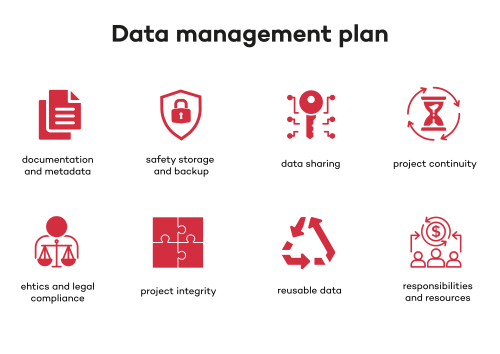
Checking that you have the necessary equipment and support in place
Helps you anticipate potential issues
Decreasing the risk of duplication, data loss or data security breach
Ensuring that the data are complete, accurate and reliable
Saving time and energy (e.g., when searching the data, writing up papers, data sharing etc.)
Some funders require a DMP (e.g., Horizon 2020, Horizon Europe, etc.)
There is no single form a DMP should have – different institutions or research funders may emphasize different aspects of research data management. The DMP submitted as part of grant funded projects should, therefore, follow the requirements of the research funder.
The content of a DMP also depends on the type of research and data collected. For example, ethics and personal data protection might be important for medical or sociological researchers. On the other hand, for researchers in biology or physics, who work with large volumes of data, issues with data storage and backup might be more important.
To give you an example, compare the DMP templates by the Digital Curation Centre and European Research Council below. If you look at the ERC template, you’ll see that even though the topics covered by the DCC template should be included here as well, the structure of the template is slightly different and puts more emphasis on FAIR principles (Findable, Accessible, Interoperable, Reusable).
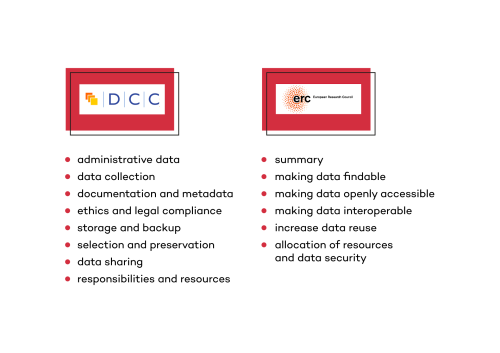
If you want to see what a completed data management plan may look like, you can check public DMPs on the DMPonline website, Data Management Plan Catalogue of the LIBER Research Data Working Group, or example DMPs and guidance, sorted by research funders, on the Digital Curation Centre’s website.
There are many ways to create a DMP. You can write it on a piece of paper or use a downloaded template in a text document editor. However, there are several web-based tools that can help you prepare a data management plan by providing you with a template, asking you specific questions about data management or providing you with further guidance on how to answer the questions. Below, we introduce three such tools: FAIR Wizard, DMPonline and Data Stewardship Wizard.
FAIR Wizard is a tool for all researchers and other academic staff who are employed or studying at the Charles University.
Using this tool, it is possible to efficiently perform data management and monitor compliance with the FAIR principles, allowing for the easy creation of a Data Management Plan (DMP). To do this, FAIR Wizard uses so-called knowledge models - interactive questionnaires that guide the researcher through the creation of a DMP step by step using questions with predefined answer options, thus freeing the researcher from having to write the DMP manually.
Detailed instructions on how to use this tool are available at the FAIR Wizard section of our website.
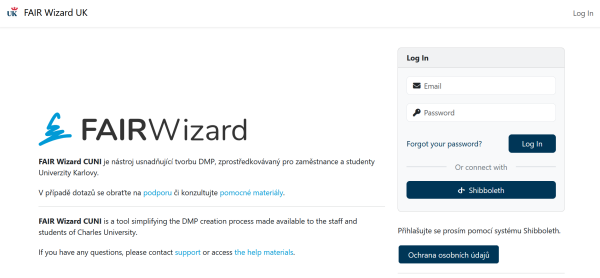
DMPonline is a publicly available web-based tool provided by the Digital Curation Centre (DCC).
The tool includes a number of pre-set templates based on the specific requirements listed in funder policy documents (you can find the list of available templates on the DMPonline website) and you create a DMP by answering questions for the selected template in the for of free text. If your funder or institution do not have specific requirements for a DMP, you might use a generic DCC template (see the picture above).
The tool also includes guidance that helps the user fill out individual sections. You can collaborate on the DMP with your colleagues setting different access rights to the DMP, and you can also share your plan publicly. Finally, you can download your plan in different formats (e.g., csv, html, docx, pdf, or json).
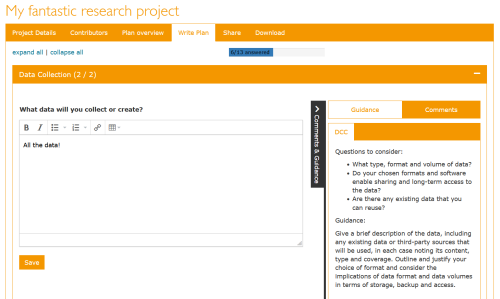
Data Stewardship Wizard (DSW) is a publicly available web-based tool developed within the ELIXIR research infrastructure.
The user does not fill out a pre-set template but rather goes through different areas of data management by filling smart questionnaires (so called Knowledge Models) that present relevant questions based on previous answers. As the users answer the questions, they gradually advance their knowledge of various aspects of data management (e.g., licensing, archiving data etc.). The advantage of this tool is that it provides FAIR metrics where relevant, guiding the user on how to make their data as FAIR as possible.
DSW, too, offers guidance to help you answer the questions (hints based on Data Stewardship for Open Science by Barend Mons, external links to relevant sections of the RDMkit), supports version history, and allows you to share the project with your colleagues setting different access rights for them. Finally, you can export the DMP in one of the supported templates (Science Europe, Horizon 2020, Horizon Europe, or Machine-Actionable DMP) in different formats (e.g., docx, pdf, html, LaTeX nebo json).
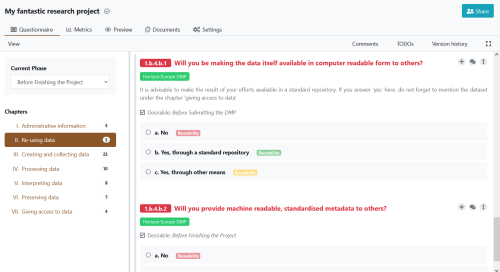
Digital Curation Centre. Data Management Plans [online]. Available online: https://www.dcc.ac.uk/resources/data-management-plans
Digital Curation Centre. 2013. Checklist for a Data Management Plan v.4.0. Edinburgh: Digital Curation Centre. Available online: https://www.dcc.ac.uk/DMPs/checklist
ELIXIR. 2021. Data management plan. Research Data Management Kit. A deliverable from the EU-funded ELIXIR-CONVERGE project (grant agreement 871075). Available online: https://rdmkit.elixir-europe.org/data_management_plan
European Commission. Data management. H2020 Online Manual [online]. Available online: https://ec.europa.eu/research/participants/docs/h2020-funding-guide/cross-cutting-issues/open-access-data-management/data-management_en.htm
Jones, Sarah. 2011. How to Develop a Data Management and Sharing Plan. DCC How-to Guides. Edinburgh: Digital Curation Centre. Available online: https://www.dcc.ac.uk/guidance/how-guides/develop-data-plan
Mons, Barend. 2018. Data Stewardship for Open Science: Implementing FAIR Principles. Chapman and Hall/CRC. ISBN: 9781315351148.
Residency, Invoicing and Correspondence Address
Charles University
Central Library
Ovocný trh 560/5
116 36 Prague 1
Czech Republic
Office Address
José Martího 2 (2nd floor)
160 00 Prague 6
Phone: +420 224 491 839, 172
E-mail: openscience@cuni.cz
Www: openscience.cuni.cz